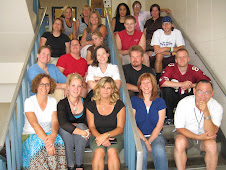What is your plan of action in the fall?
I will not be teaching this fall as I will continue with my graduate assistantship and course work at MSU. My plan is to keep the information from the summer institute current in my mind so that when I do return to the classroom, I can access and implement many of the great demo ideas. I can do this by being as participatory as possible with the writing project activities. Part of my job and studies at MSU is research. I plan on using the demo ideas as beginning places to develop and write about current best practices in the field of reading and writing.
What’s your plan for your own writing?
Plans for my own writing involve daily writing in my journal as a reflective practice. I also plan to continue writing about the reseach that I do in the field of Reading and English Education. I will be writing an extensive degree paper, and that will be a major focus for the upcoming year.
How will your classroom look differently daily? Weekly? Monthly?
When I do return to the classroom, my classes in high school English will have a focus on some type of daily reading, writing, and sharing. Daily writing may include practices such as journaling, entrance and exit slips, freewrites, and lists. I believe that students should have some form of reading everyday. This reading may include independent reading, teacher read aloud, partner reading, reader's theatre, and choral reading. Sharing will take the form of whole class, partner, performance, and small group collaborative activities.
On a weekly or bi-weekly basis, having students meet in small writing groups will be a part of my classroom. The idea of reformulation and multiple drafts will be emphasized. One area I want to explore is that of the writing and reading workshop approach. This might be something that my class will work with and meet as groups twice a week.
Discuss the process of creating your demo and what you discovered through that process. How will you incorporate your demo in the fall?
I found having a demo modeled prior to the development of my demo extremely helpful. One of the prompts during that modeling was to take note of the process of the demo. This was helpful. I accessed articles and books from the university library, and my coach provided me a book where I found activity ideas for my demo. I read these materials and sketched out a plan for the presentation. I discovered in this process that having a plan was most beneficial. I created a time line for the activities, and this was useful when I was presenting. When I return to the classroom, I will present my demo in a series of mini-lessons to my class at the beginning of the year. That way, students can work with the ideas of image grammar and incorporate the skills into their writing. These can be reviewed as often as necessary.
What kinds of student writing samples can you collect?
Since I will not be teaching in a classroom, the samples that I will have will be my own. I hope to have drafts and reformulations of my personal writing and of professional article drafts.
How has your writing project experience affected your plan?
The writing project has convinced me that writing is a way for learning. The more writing activities and writing projects that I can include in my lesson and unit plans will help students learn.
How will you use other demonstrations? Please list several demos that you saw that you will integrate into your classroom. Based on our brief conversations and your new knowledge of OWP programs, what areas interest you? Who would you nominate for certain areas?
I found the demos that had to do with identity and critical thinking to be the most intriguing and current for students. Any of the reading-writing connection ideas that have to do with students making connections such as with text to text, text to self, and text to world. I foresee selecting specific activities from demos such as writing territories, identi-kits, multi-genre, responding to non-print texts, photographs and other media connections to text, film analysis, etc, and adapting these to the specific curriculum I may someday teach.
I nominate Michelle K. for future presentations of her demo at a conference. Her idea was interactive, used media, and required a stretch for creativity. Very hands on but much thinking was required. I also found Dana C. demonstration about how we see ourselves and how others see us as useful, and her multi-genre approach was excellent.
Subscribe to:
Post Comments (Atom)








No comments:
Post a Comment